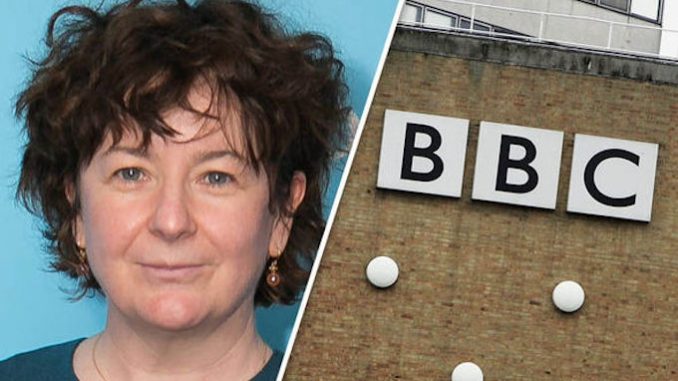
Woman’s Hour presenter Jane Garvey says she would earn more if she ‘had balls and talked balls’ as she described being a white man as ‘a lucrative business’.
The Radio 4 host, now on a salary of £121,000 a year, says women are still being paid less than men at the British Broadcasting Corporation (BBC).
Ms Garvey made the comments in a column in the Sunday Times.
Despite a ‘pay revision’ boosting her salary for working on Woman’s Hour Ms Garvey wrote: ‘I’d certainly earn more if I had balls and talked balls.’
Men and women are still not being treated equally and the BBC are ‘doing a good line in nothing-to-see-here’, according to the presenter.
To illustrate her point she says Karen Martin, a female BBC manager, turned down a promotion because she was offered £12,000 less than a male colleague.
In their response the BBC said her male colleague had different levels of experience.
‘One of the things he hadn’t experienced was two periods of maternity leave,’ Ms Garvey says.
The BBC’s gender pay gap is ‘an impressively low’ 6.7 per cent but women are ‘still weeping in to our soya flat whites’, she adds.
‘Women’s work is not valued in the same way as work by men. It’s mowing grass versus wiping bottoms,’ she says.
It comes as nearly half of all major British companies failed to reduce their gender pay gap over the last year – despite rising government pressure and public scrutiny.
Of the organisations which met April’s deadline for reporting gender pay figures, 78 per cent had a gap in favour of men — despite Theresa May vowing last year to tackle the ‘burning injustice’ of unequal pay.
The gap actually became bigger in 45 per cent of companies – mainly due to men’s earnings rising faster than women’s.
Among the worst offenders was garage chain Kwik Fit, where the difference was 14 per cent in favour of men – meaning that for every £10 paid to a man, women earn £8.60.
Other high-profile organisations which reported large pay gaps for 2018/19 were Ryanair (64.4 per cent), health provider Intrahealth (57.4 per cent) and Sheffield United football club (48.2 per cent).
Employers whose gender pay gap increased in size year-on-year also include Huddersfield Town FC (20.9 per cent to 39.6 per cent), the Department for Digital, Culture, Media and Sport (up from 8.2 per cent to 22.9 per cent) and Dyfed-Powys Police (from 8.0 per cent to 22.5 per cent).
Of the 10,450 organisations who had reported their figures by Friday, April 5, 78 per cent (8,128) showed a gender pay gap in favour of men while 14 per cent (1,427) showed a gap in favour of women, with the rest reporting no difference.
The BBC’s biggest earning stars don’t represent good value for money, survey finds
The BBC’s highest paid stars are not worth their salaries’, according to a new survey.
The corporation’s annual list of its biggest earning talent, with Match of the Day host Gary Lineker topping the list on £1.75million a year.
But when Britons were asked whether they thought the highest profile, best-paid stars were good value or a rip-off, every celebrity was given a negative score.
Chris Evans, who has now left the BBC but was most recently paid £1.25 million for his stint at Radio 2, had a value-for-money rating of minus 58.
He beat Lineker to top spot in the OnePoll.com survey, with the big-earning Match of the Day host handed a score of minus 54.
BBC radio host Vanessa Feltz had a minus 49 rating, while Lineker’s TV partner Alan Shearer – who earns £440,000 as a pundit – was fourth with a negative score of 38
Of the highest paid stars, Question Time host Fiona Bruce fared the best, but she still had a minus eight rating.
OnePoll surveyed 1,930 UK adults, asking if they thought the biggest earners were either good, reasonable, poor value or a rip-off.
The stars were then given a score by taking poor value ratings away from good value ratings.
However, there is support for one BBC stalwart.
Sir David Attenborough, who wasn’t on the list because he was paid through a production company, was given a positive value of 52 per cent.
Just 34 per cent of Brits polled thought that overall the BBC was good or very good value for money, with 61 per cent describing it as poor value or a right rip off.
Two-thirds think it is now time to change the way the BBC is funded.
There also appears to be a lack of trust in the corporation’s impartiality, with 51 per cent saying it is biased and just 26 per cent describing it as impartial.
OnePoll found 46 per cent of those who thought it was biased said it was against Brexit, while 19 per cent it was in favour of leaving the EU.
Name – Salary band – Value for money rating*
Fiona Bruce £255,000-£259,999 -8
John Humphrys £290,000-£294,999 -12
Graham Norton £610,000-£614,999 -18
Andrew Marr £390,000-£394,999 -18
Jeremy Vine £290,000-£294,999 -19
Huw Edwards £490,000-£494,999 -25
Jason Mohammad £355,000-£359,999 -25
Claudia Winkelman £370,000-£374,999 -28
Nick Grimshaw £310,000-£314,999 -32
Steve Wright £465,000-£469,999 -34
Alan Shearer £440,000-£444,999 -38
Vanessa Feltz £355,000-£359,999 -49
Gary Lineker £1,750,000-£1,754,999 -54
Chris Evans £1,250,000-£1,254,999 -58
* Value for money rating: The star’s ‘good or reasonable value’ score minus their ‘poor or rip-off value’ score